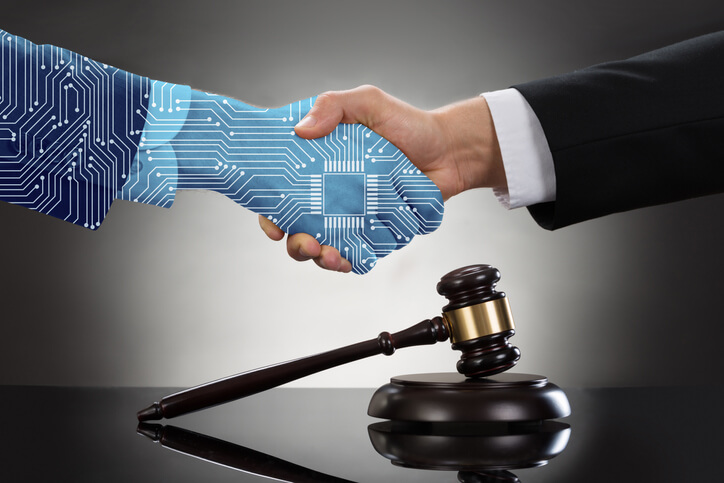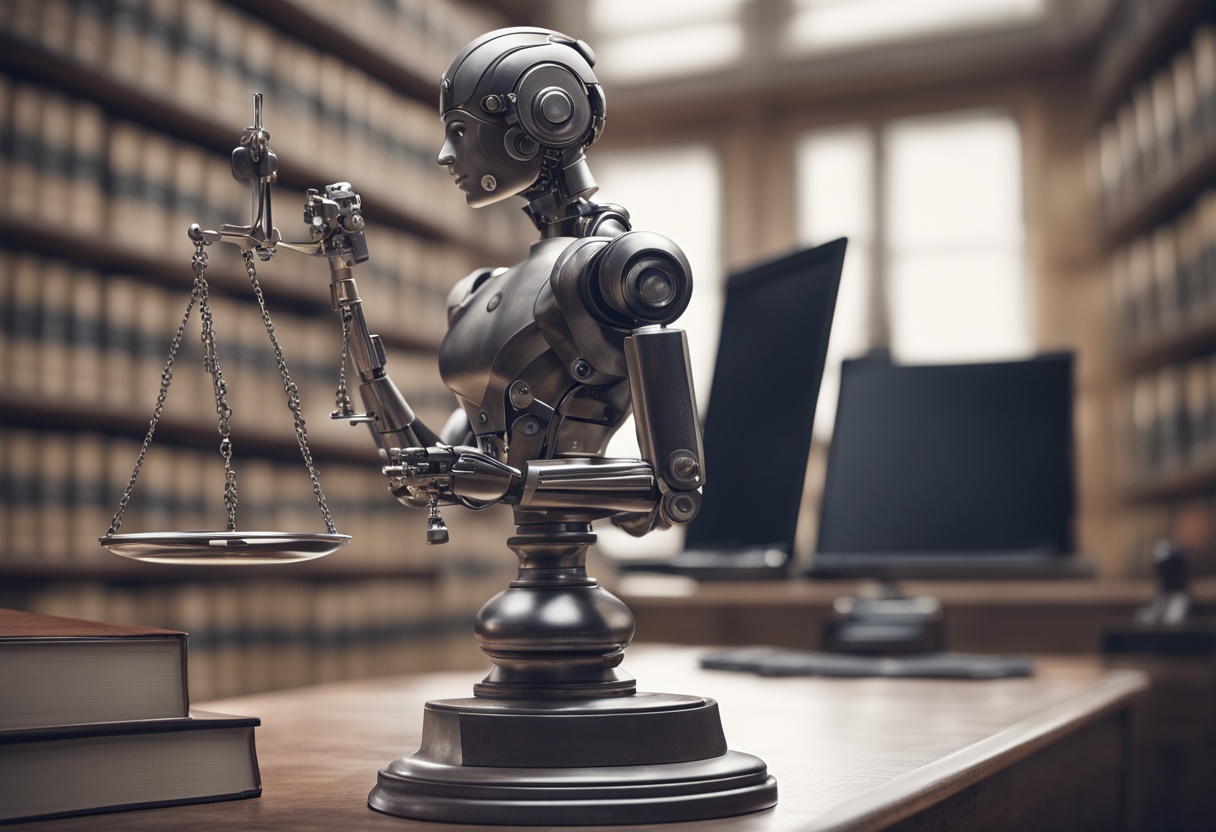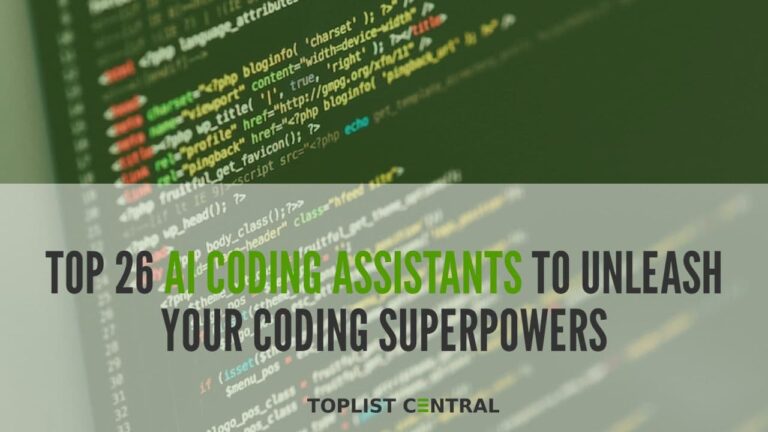Ai Tools for Lawyers: Revolutionize Your Practice
AI tools for lawyers enhance efficiency and accuracy in legal tasks. These platforms aid in research, document review, and case management.
In today’s fast-evolving legal landscape, attorneys must embrace technology to stay competitive. AI tools have become indispensable assistants in law firms, streamlining complex processes and unlocking new capabilities. They enable lawyers to sift through vast amounts of legal data quickly, identify patterns, and extract pertinent information.
These innovations not only save time but also bolster the precision of legal analyses. Moreover, AI applications in law extend to predicting case outcomes, automating client intake, and even assisting in drafting legal documents. Embracing these tools can lead to more informed decision-making and a higher level of service for clients. By leveraging AI, legal professionals can redirect their focus on strategic thinking and client relationships, with mundane tasks efficiently handled by intelligent systems.
The Rise Of Ai In Legal Practice
The legal industry is transforming swiftly, and artificial intelligence (AI) is leading this change. Lawyers now embrace AI to enhance efficiency, accuracy, and innovation in their work. This evolution in law practice promises a future where technology and legal expertise join forces.
Influence On Legal Research
AI has revolutionized legal research, enabling lawyers to sift through mountains of data efficiently. The technology uses natural language processing to understand and contextualize legal language. This ensures that legal professionals can get precise case laws, statutes, and precedents quickly. As a result, lawyers can focus on crafting compelling legal arguments rather than spending hours on research.
- AI tools turn weeks of research into hours.
- Accurate search results reduce the risk of overlooking key information.
- AI can predict legal outcomes based on historical data.
Automation Of Routine Tasks
AI also steps in to automate repetitive tasks that weigh down the legal process. With AI, document review and due diligence activities become streamlined, boosting efficiency in the practice. This automation frees up valuable time for lawyers, allowing them to concentrate on more complex and creative aspects of their cases.
| Task | Impact of AI |
|---|---|
| Document Analysis | Reduces hours to minutes |
| Contract Review | Enhances accuracy and consistency |
| Legal Writing | Streamlines drafting basic documents |

Credit: www.lexisnexis.com
Key Ai Tools Transforming Law Firms
As law firms embrace technology, AI tools offer innovative solutions.
These tools help lawyers work smarter and faster. Here, we explore key AI tools reshaping law practices.
Document Review Platforms
Document Review Platforms
AI-equipped document review platforms are revolutionizing how law firms handle data. These platforms can sort and analyze thousands of legal documents in minutes. They improve accuracy and save time.
- Automated data extraction
- Intelligent search capabilities
- Case-relevant pattern recognition
Predictive Analysis Software
Predictive Analysis Software
Predictive analysis software uses past case data to forecast outcomes. Lawyers can anticipate risks and make informed decisions. This software can suggest the likelihood of winning a case.
| Benefits | Uses |
|---|---|
| Enhanced strategic planning | Risk assessment |
| Efficient resource allocation | Outcome predictions |
Chatbots for Client Interaction
Chatbots For Client Interaction
Chatbots are changing client-lawyer interaction. These AI chatbots provide instant responses to client inquiries. They can even help with initial case assessments.
- 24/7 client service
- Initial legal guidance
- Appointment scheduling assistance
Ethical Considerations
As artificial intelligence (AI) integrates into the legal sector, ethical implications surface. AI tools for lawyers streamline workflow but entail critical ethical considerations. Lawyers must balance innovation with their ethical codes. Understanding confidentiality, privacy, AI decision-making, and accountability is crucial.
Confidentiality And Privacy
Legal professionals hold a fundamental duty to protect client information. AI tools handling sensitive data must embody strict safeguards. Below, critical points outline confidentiality and privacy concerns:
- Data encryption during storage and transfer
- Access control measures for authorization
- Regular audits to detect potential breaches
Tools must comply with legal standards, such as the General Data Protection Regulation (GDPR) and the American Bar Association (ABA) guidelines. Firms should ensure AI systems align with these standards.
Ai Decision Making And Accountability
AI in legal decisions raises questions around reliability and accountability. Consider the following:
| AI Decision Making | Human Accountability |
|---|---|
| AI provides data-driven insights | Lawyers interpret AI suggestions |
| AI tools identify patterns | Lawyers make the final call |
| AI assists with predictive analysis | Lawyers ensure fair use |
Leveraging AI requires clear responsibility delineation. AI assists; humans decide. Ethical practice necessitates lawyers to remain accountable for AI-influenced decisions.
Improving Legal Outcomes With Ai
Artificial Intelligence (AI) is revolutionizing the legal landscape. Tools powered by AI are helping lawyers achieve more favorable results for their clients. Lawyers use AI to analyze data, predict case outcomes, and build stronger strategies.
Enhancing Case Strategy
AI tools offer lawyers a competitive edge in shaping their case strategies. By assessing past legal cases, AI can identify trends. These trends give lawyers key insights to optimize their approach. The use of AI helps in:
- Evaluating the strengths and weaknesses of a case
- Forecasting possible judicial decisions
- Preparing for different case scenarios
These strategies lead to better preparedness and improved advocacy.
Data-driven Legal Insights
Accessing vast legal databases, AI tools deliver precise and relevant information. The insights derived from AI include:
- Statistical analysis of similar cases
- Probability of case success
- Judges and opposing counsels’ history and patterns
Armed with this data, lawyers make informed decisions, winning cases more efficiently.
Ai’s Impact On Legal Employment
The legal profession stands on the brink of a revolution fueled by artificial intelligence (AI). AI is reshaping roles and employment opportunities within the legal sector. Let’s delve into how AI’s integration is transforming skill requirements and creating new avenues for specialization.
Shifts In Skill Requirements
The integration of AI in legal practices has initiated a substantial shift in skill requirements for legal professionals. Attorneys and paralegals now need proficiency in technology to stay relevant in the field.
- Data analysis expertise now complements traditional legal skills.
- AI tools require lawyers to develop new competencies in software usage.
- Understanding of AI-driven research tools becomes critical.
Legal jobs today demand a combination of legal acumen and technical know-how.
Opportunities For Legal Tech Specializations
The advent of AI opens up new specialties within the legal sector. Opportunities are growing for legal tech experts. They bridge the gap between law and technology.
| Specialization | Skills Required | Job Role |
|---|---|---|
| Legal Data Analyst | Data mining, AI algorithms | Analyzing complex datasets |
| Automated Contract Manager | Machine learning, contract law | Overseeing AI-based contract systems |
| E-discovery Specialist | Information retrieval, AI software | Managing digital evidence discovery |
Law firms now seek individuals who can fill these tech-centric roles. Specialists focus on optimizing legal processes through AI.

Credit: www.lexisnexis.com
Preparing For An Ai-enabled Future
Embracing an AI-Enabled Future needs careful preparation by lawyers.
AI tools offer incredible benefits for legal practices.
They streamline research, automate tasks, and predict legal outcomes.
To stay ahead, lawyers must keep learning and invest in new tech.
This preparation ensures lawyers maintain a competitive edge.
Let’s explore how continuing education and technology investments can help.
Continuing Legal Education
Continuing legal education (CLE) is vital.
It keeps lawyers up-to-date with AI advancements.
CLE not only covers legal updates but also tech evolutions.
Here are ways to integrate CLE into daily practice:
- Online courses: Webinars and workshops about AI benefits.
- Seminars: Interactive sessions with tech experts.
- Reading materials: Journals and articles on AI topics.
Prioritize areas where AI impacts greatly, like contract analysis.
Take courses tailored to these areas.
That helps to use AI effectively.
Investing In Legal Tech
Investing in legal tech is essential.
It means not just buying software but understanding it too.
Lawyers benefit from AI tools they trust and know how to use.
Here are steps for investing in the right tech tools:
- Research: Investigate tools that match your needs.
- Training: Train your team on how to use new tools.
- Updates: Keep your software up-to-date for best performance.
Make sure the tech aligns with your practice areas.
A tool that excels in contract automation might not suit litigation as well.
Choose wisely to see the best return on your investment.
Investing smartly prepares you for the future of law.
It also provides a better service for clients.
Embrace AI and watch your practice thrive.

Credit: medium.com
Frequently Asked Questions On Ai Tools For Lawyers
What Ai Tools Are Lawyers Using?
Lawyers utilize AI tools like ROSS for legal research, Lex Machina for case analytics, and Chatbots for client interaction. These aid in document review, prediction of litigation outcomes, and legal workflow automation.
How Is Ai Being Used In Law?
AI streamlines legal research, automates document analysis, enhances due diligence, predicts legal outcomes, and assists with contract review. It also helps manage case-related data and streamline administrative tasks in the legal profession.
Can Ai Do The Job Of A Lawyer?
AI can assist lawyers by automating tasks and analyzing data, but cannot fully replace the expertise and ethical judgment of a human lawyer.
How To Use Ai For Litigation?
Utilize AI in litigation for data analysis, predictive outcomes, and document review. Implement AI algorithms to identify patterns and insights, aiding case strategy. AI tools streamline e-discovery, saving time and resources. Train AI using historical case data for accurate predictions and risk assessments.
Conclusion
Embracing AI tools equips lawyers with unparalleled advantages. From streamlining case analysis to ensuring due diligence, these technological wonders promise efficiency and accuracy. As legal landscapes evolve, staying ahead means integrating such innovations into practice. To thrive, modern attorneys should consider AI a vital ally in their quest for legal mastery.






